#opec crude oil
Text

#us politics#2022#political cartoons#the handmaid's tale#handmaid's tale#abortion bans#codify roe#roe v. wade#biden administration#vote#go vote#vote blue#reproductive rights#reproductive health#abortions#oil and gas#gas prices#opec#opec crude oil#opec output
711 notes
·
View notes
Text
U.S. Rep. Ro Khanna on Wednesday urged the Biden administration to cut off sales of weaponry and crucial plane parts to Saudi Arabia as the Organization of the Petroleum Exporting Countries—a cartel led by the Saudis—agreed to slash oil production in a bid to prop up falling prices, a move that could inflict more pain on American consumers.
"President Biden should make it clear that we will stop supplying the Saudis with weapons and air parts if they fleece the American people and strengthen [Russian President Vladimir] Putin by making drastic production cuts," Khanna (D-Calif.) told The Washington Post in an interview as OPEC members met in Vienna.
"They need us far more than we need them," Khanna added.
The Biden White House launched a pressure campaign earlier this week in a last-ditch bid to stop OPEC from cutting supply, characterizing such a move as a "hostile act."
But the administration's efforts failed. On Wednesday, OPEC members agreed to slash their combined production by two million barrels a day, the largest supply cut since the onset of the coronavirus pandemic in 2020.
Saudi Arabia is the second-largest oil producer in the world behind the U.S., and the Biden administration has sought cooperation from the kingdom's murderous leaders as Russia's war on Ukraine continues to rattle global energy markets, elevating prices for consumers. While not a formal OPEC member, Russia—the world's third-largest oil producer—often works with the international cartel.
In July, U.S. President Joe Biden held a widely condemned meeting with Saudi Crown Prince Mohammed bin Salman to discuss the global oil supply, among other issues.

The White House has warned an OPEC production cut could reverse the large and consistent declines in U.S. gas prices over the past several months, just in time for the pivotal midterm elections. Expectations of a production cut have already driven oil prices up significantly in recent days.
"We've been clear that energy supply should meet demand to support economic growth and lower prices for consumers around the world and we will continue to talk with our partners about that," White House National Security Council spokesperson Adrienne Watson said in a statement Tuesday.
Khanna, a progressive seen by some as a future presidential candidate, is a longtime critic of the Saudi regime—particularly its devastating assault on Yemen. He has been pushing the White House in recent days to respond forcefully to any OPEC production cut.
"It's outrageous. The Saudis need to be dealt with harshly," Khanna told CNN in an interview earlier this week. "They are a third-rate power. We are the most powerful country in the world. I don't know why we kowtow to them."
"They are not our allies," the California Democrat added. "They are hurting the American people. And we need to be tough with them. The President needs to make it clear we will cut off their supply. We could ground their air force in a day."
Sen. Bernie Sanders on Wednesday called for an end to U.S. military aid to Saudi Arabia after the kingdom and other major oil-producing nations agreed to slash output by two million barrels a day, a move that could significantly drive up gas prices worldwide as a global recession looms.
In a social media post, Sanders (I-Vt.) denounced the Saudi-led OPEC cartel over its "blatant attempt to increase gas prices at the pump," which he said "cannot stand."
"We must end OPEC's illegal price-fixing cartel, eliminate military assistance to Saudi Arabia, and move aggressively to renewable energy," the Senator added.
Sanders was one of several members of the U.S. Democratic caucus who responded with outrage to OPEC and Russia's decision, which is set to take effect in November as the midterm elections kick off.
Sen. Ed Markey (D-Mass.) announced Wednesday that he will be reintroducing legislation instructing U.S. officials to "initiate dispute proceedings" against OPEC members at the World Trade Organization for violating the body's price-manipulation rules.
"As we build our clean energy future, we must stand up to the oil-soaked global cartel that seeks to abuse its power to raise prices and boost their profits," Markey said in a statement. "Today's OPEC announcement is a reminder that as long as the United States is dependent on foreign oil and on domestic oil that is priced on a global market, the supply and cost of the energy Americans use to operate our cars, heat our homes, and power our economy is reliant on decisions made by and for hostile fossil-fueled regimes."
"We must hold OPEC and its allies accountable for colluding to hike energy prices on working families," Markey added, "and we must accelerate our transition to clean energy to free ourselves from their profiteering, colluding grip once and for all."
Reps. Tom Malinowski (D-N.J.), Sean Casten (D-Ill.), and Susan Wild (D-Pa.), meanwhile, unveiled legislation that would require the removal of U.S. troops and missile defense systems from Saudi Arabia and the United Arab Emirates (UAE), another OPEC member.
"Saudi Arabia and the UAE's drastic cut in oil production, despite President Biden's overtures to both countries in recent months, is a hostile act against the United States and a clear signal that they have chosen to side with Russia in its war against Ukraine," the House Democrats said in a joint statement Wednesday.
"Both countries have long relied on an American military presence in the Gulf to protect their security and oil fields," the trio added. "We see no reason why American troops and contractors should continue to provide this service to countries that are actively working against us."
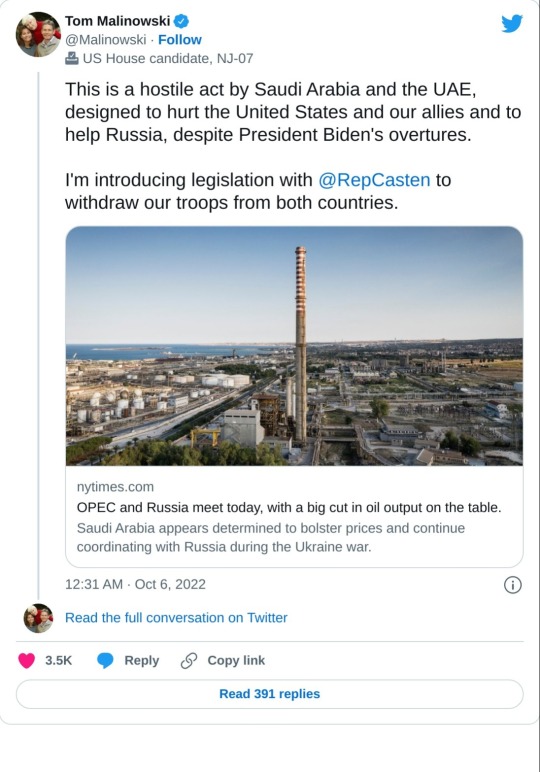
The Biden White House has thus far indicated that it is considering a number of policy responses to "reduce OPEC's control over energy prices"—signaling a possible revival of NOPEC legislation—but the administration hasn't specifically said it would target U.S. military assistance to the Saudis.
According to a recent study by the Government Accountability Office, the Pentagon delivered at least $54.6 billion of military aid to Saudi Arabia and the UAE between fiscal years 2015 and 2021, support that included missiles, helicopters, and bombs.
The U.S. has also spent hundreds of millions of dollars in recent years refueling Saudi and UAE jets as they attacked Yemen, sparking a humanitarian catastrophe that continues in the present.
Despite the President's campaign pledge to make the kingdom a "pariah" over its assassination of Jamal Khashoggi, the Biden administration has continued to approve massive weapons sales to the Saudis, including a multibillion-dollar sale of missiles in August. A month earlier, Reuters reported that the Biden administration was considering lifting its ban on "offensive" weapons sales to the Saudis.
Rep. Ro Khanna (D-Calif.) has been vocally pressing the Biden administration to halt U.S. military support for Saudi Arabia in response to OPEC's coming production cut, blasting the petrostate as a "third-rate power" that is "hurting the American people."
On Wednesday, Khanna co-authored an op-ed calling for an end to "missile and weapons system sales Saudi so desperately needs."
"By siding with Russia in hiking oil prices and sabotaging our economy," Khanna and two others wrote, "the Saudis have really outfoxed themselves this time—it was a time for choosing, and they picked the wrong side."
#us politics#news#common dreams#2022#biden administration#opec#saudi arabia#united arab emirates#yemen#Rep. Ro Khanna#sen. bernie sanders#sen. ed markey#rep. Tom Malinowski#rep. Sean Casten#rep. Susan Wild#opec crude oil#big oil#oil and gas#gas prices#Government Accountability Office#the pentagon#the washington post#prince mohammed bin salman#ukrainian crisis#russo ukrainian war#vladimir putin#trita parsi#Adrienne Watson#World Trade Organization#nopec
12 notes
·
View notes
Link
12 notes
·
View notes
Video
youtube
Near the end, don’t miss the Oil Company execs talking about shareholder profits.
2 notes
·
View notes
Text

Black Gold Booming! Explore: https://markets.tradermade.com/commodity/black-gold-booming. #Oil prices surge on strong demand, supply woes & Middle East tensions. OPEC meeting next & possible gas price hikes on the horizon!
0 notes
Text
Russia, Saudi Arabia and several OPEC+ producers extend crude supply cuts
OPEC+ has extended oil supply cuts until mid-year to prevent a global glut and support prices.
The new restrictions, which on paper amount to about 2 million barrels a day, will be in place until the end of June, according to statements from members such as Saudi Arabia, which accounts for half of the promised cuts. Russia has promised to step up its role by focusing on cutting production rather than exports.
Traders and analysts had widely expected an extension of the agreement, believing it was needed to offset a seasonal lull in global fuel consumption and surging production from several OPEC+ rivals, most notably US shale drillers. The need for caution is reinforced by the uncertain economic outlook in China.
Ample supplies have kept global oil prices near the $80 a barrel mark this year, even as conflict in the Middle East weighs heavily on regional shipping. While that brings some relief to consumers after years of rampant inflation, prices may be too low for many members of the Organisation of Petroleum Exporting Countries and its partners.
Read more HERE
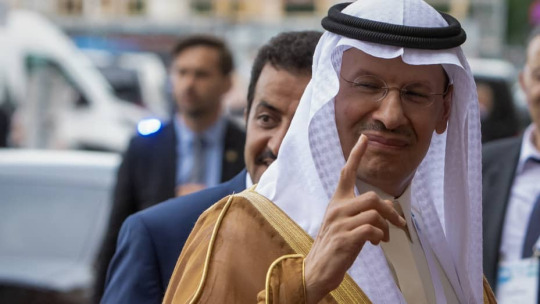
#world news#world politics#news#russia#russia news#russian news#russia politics#russian politics#saudi arabia#opec#opec+#oil prices#oil#oil and gas#crude oil#oil production
0 notes
Text
Oil: Oil on track to snap losing streak on hopes of further OPEC+ cuts
SINGAPORE – Oil prices rose on Tuesday, snapping a multi-session losing streak ahead of a crucial meeting of OPEC+, which is widely expected to deepen and extend cuts to oil production amid fears of supply being consistently higher than demand.Brent crude futures were up 45 cents, or 0.6%, at $80.43 a barrel at 0152 GMT, on track to snap a four-day losing streak. U.S. West Texas Intermediate…

View On WordPress
0 notes
Video
youtube
Farewell Arabia UAE Oil discovery documentary
0 notes
Text
OPEC+ to consider deeper oil output cuts ahead of Russia sanctions and proposed price cap
OPEC+ to consider deeper oil output cuts ahead of Russia sanctions and proposed price cap
OPEC+, a group of 23 oil-producing nations led by Saudi Arabia and Russia, will convene on Sunday to decide on the next phase of production policy.
Bloomberg | Bloomberg | Getty Images
OPEC and non-OPEC oil producers could impose deeper oil output cuts on Sunday, energy analysts said, as the influential energy alliance weighs the impact of a pending ban on Russia’s crude exports and a possible…
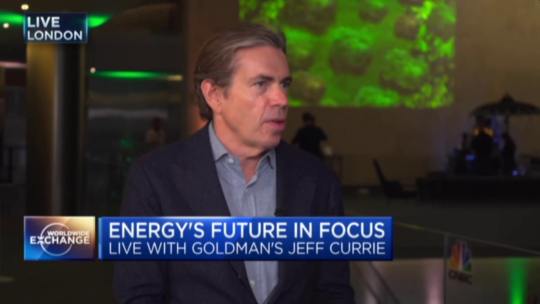
View On WordPress
#business news#China#Energy#ICE Brent Crude (Jan&x27;23)#Oil and Gas#OPEC#OPEC Meetings#Politics#russia#WTI Crude (Dec&x27;22)
0 notes
Text
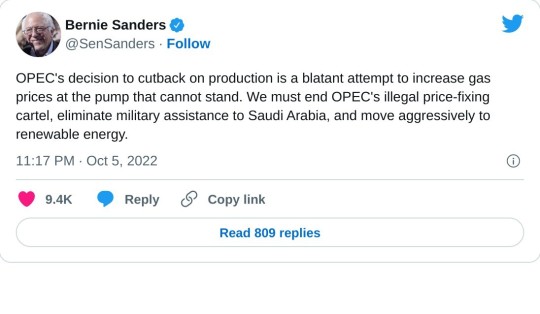
#us politics#2022#twitter#tweet#sen. bernie sanders#opec#opec crude oil#saudi arabia#oil and gas#gas prices#renewable energy#green new deal#green energy
100 notes
·
View notes
Text
French President Emmanuel Macron was caught revealing some bad news to President Joe Biden on the sidelines of the G7 summit Monday.
Macron told Biden the United Arab Emirates’ (UAE) ruler, Sheikh Mohammed bin Zayed al-Nahyan, informed him that OPEC’s top oil exporters were already at their production maximum.
“I had a call with MbZ,” Macron told Biden, referring to Mohammed bin Zayed al-Nahyan, Reuters reported. The comments were overheard by Reuters TV. “He told me two things. I’m at a maximum, maximum [production capacity]. This is what he claims.”
“And then he said [the] Saudis can increase by 150 [thousands barrels per day]. Maybe a little bit more, but they don’t have huge capacities before six months’ time,” the French president reportedly added.
UAE’s top energy official responded to the reports, saying the country is producing “near” its maximum capacity.
“In light of recent media reports, I would like to clarify that the UAE is producing near to our maximum production capacity based on its current OPEC+ production baseline,” Energy Minister Suhail bin Mohammed Al Mazrouei tweeted.
Macron’s claims go against official data, and if true, would bring challenges to the global market in light of the boycott on Russian oil in response to the country’s invasion of Ukraine, according to Bloomberg.
Oil prices have been steadily going up in the past year in part due to increased demand post COVID-19 and a lack of supply caused by restrictions on oil production. The prices were further exacerbated by Russia’s invasion of Ukraine, but prices had already risen 55 percent the day before Russian President Vladimir Putin’s orders.
Biden waged a war on domestic energy production upon taking office, including canceling the Keystone XL pipeline, banning new oil and gas leasing on public lands, and stopping the sales of several drilling areas in Alaska and the Gulf of Mexico.
Biden is set to meet Saudi Crown Prince Mohammed bin Salman in July as a part of his trip to the Middle East. The president previously vowed to make Saudi Arabia a global “pariah” after the suspected killing of Washington Post journalist Saudi journalist Jamal Khashoggi.
#us politics#news#yahoo#big oil#opec#opec crude oil#opec output#oil#oil prices#petroleum#Emmanuel Macron#france#biden administration#president joe biden#2022#Sheikh Mohammed bin Zayed al-Nahyan#united arab emirates#uae#Reuters#saudi arabia#Suhail bin Mohammed Al Mazrouei#Prince Mohammed bin Salman#bloomberg#jamal khashoggi
3 notes
·
View notes
Text
Crude Oil Prices Rise as US Dollar Slides
Crude Oil Prices Rise as US Dollar Slides
Crude Oil Prices Rise as US Dollar Slides
Oil prices extended gains on Tuesday from the easing value of the US dollar that encouraged cheaper oil purchases and positive demand indicators from China, the world’s second-largest oil consumer.
The international benchmark Brent crude traded at $92.14 per barrel, translating to a 0.57% gain from the closing price of $91.62 a barrel in the previous…

View On WordPress
0 notes
Text
OPEC
Organization of the Petroleum Exporting Countries
Formed Sept 1960 by 5 countries:
Iran, Iraq, Kuwait, Saudi Arabia and Venezuela
13 Member Countries 2022:
Iran - founder
Iraq - founder
Kuwait - founder
Saudi Arabia - founder
Venezuela - founder
Libya (1962)
United Arab Emirates (1967)
Algeria (1969)
Nigeria (1971)
Angola (2007)
Gabon (2016)
Equatorial Guinea (2017)
Congo (2018)
OPEC distinguishes between the Founder Members and Full Members
OPEC Secretariat is the executive organ (their word, not mine)
Located in Vienna, it also functions as the Headquarters of the Organization
Pics & CV’s of the leadership at the link
2016 created OPEC+ to add 10 non-OPEC oil exporting countries
Azerbaijan
Bahrain
Brunei
Kazakhstan
Malaysia
Mexico
Oman
Russia
South Sudan
Sudan
OPEC+ controls over 50% of global oil supplies and about 90% of proven oil reserves.
OPEC+ came into existence, in part, to counteract other nations' capacity to produce oil, which could limit OPEC's ability to control supply and price.
OilPrice dot com
OPEC's Influence on Global Oil Prices
American Petroleum Institute (API) | Gas Prices Explained
2 notes
·
View notes
Text
Oil traders stay bullish as Brent hovers at $90: Here's why crude is elevated
The world’s top commodity traders and analysts are increasingly confident of a bullish oil market into the second half of the year after Brent crude prices pierced $90 per barrel for the first time in months. The elevation in crude prices comes after the Organisation of Petroleum Exporting Countries and its allies (OPEC+) kept its output policy unchanged till mid-2024 and pressed some oil…
View On WordPress
#Brent crude futures#brent crude oil prices#brent crude prices#crude oil price#crude oil prices#global oil traders#middle east tension#morgan stanley#oil traders#opec output cut#opec production cuts#opec supply cuts#opec+ nations
0 notes
Text
Higher crude prices and interest rates may discourage consumer spending
Ravindra Rao, VP- Head Commodity Research, Kotak Securities
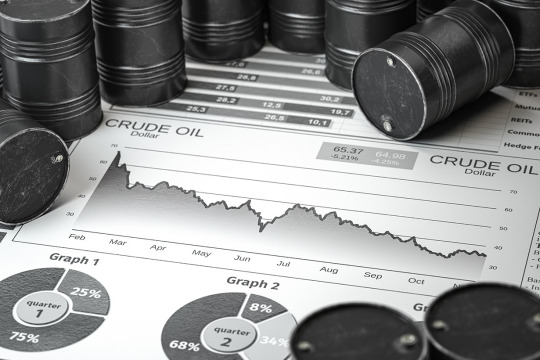
After surging to multi-year highs earlier this year during the Russia-Ukraine conflict, oil prices dipped in June amid fears of a global recession and interest rate hikes. September saw oil prices fall below $90 from the highs of over $130 per barrel in March.
Recently, OPEC+ announced it would dramatically reduce oil production. Furthermore, speculations indicate that demand will falter due to concerns about a recession. The recent conversation and rate hike environment have prompted several worrisome conversations. In this context, Ravindra Rao, VP and Head of Commodity Research at Kotak Securities, shares his expert insights.
Continue reading...
0 notes
Text
OPEC+ agreed to cut oil production
OPEC+ oil producers agreed on Thursday to voluntary production cuts totalling about 2.2 million barrels per day (bpd) for early next year. Saudi Arabia, which extended its current voluntary cut, headed the agreement, according to Reuters.
Baseline global oil prices declined about 2 per cent, partly because the cuts were voluntary, but also because investors expected before the meeting that additional supply cuts could be deeper.
Saudi Arabia, Russia and other OPEC+ members, which produce more than 40 per cent of the world’s oil, met online on Thursday to discuss supply policy. JP Morgan analyst Christyan Malek stated that the market reaction reflected a distrust in the cuts’ full effectiveness.
However, setting a new framework for each member to deliver on its cut reflects the degree of trust and cohesion among the members; case in point, the fact Brazil is joining is testament to the strength in numbers for OPEC+.
Read more HERE

#world news#world politics#news#opec#opec+#crude oil#oil production#oil and gas#oil prices#fossil fuels#saudi arabia#russian politics#russian#russia#russian oil
0 notes